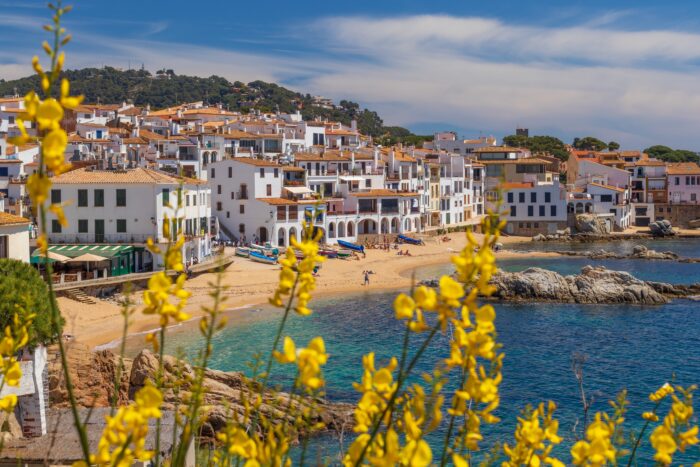Retiring in Spain
Spain is a top destination for visitors and retirees to flock to, and for very good reasons. The weather, affordability, and quality of life are just a few reasons that make this country so desirable for retirement. Thousands of Americans each year choose to retire abroad to take advantage of lower expenses, better healthcare, and a relaxed pace of life. If Spain is on your short-list, come explore how to retire in Spain and the pros and cons of retiring here!

How to retire in Spain
There are several visa options to pursue if you wish to retire in Spain. There is the golden visa, permanent residency visa, and the non lucrative visa. There are positives and negatives to all of these options; for example, the golden visa requires a €500,000 investment in the Spanish economy (most commonly a property investment) and the permanent residency visa requires that you have lived in Spain for the previous 5 years.
Of these options, the most popular visa for retirees is the non lucrative visa. Also called the retirement visa, the non-lucrative visa allows you to live in Spain as long as you can financially support yourself without working. This means you will need proof of sufficient funds amounting to roughly $33,000 at time of writing this piece.
If you’d like to learn more about your visa options in Spain, grab your copy of I’m Outta Here! An American’s Ultimate Visa Guide to Living in Europe. It covers the best and easiest long-term visa options for Spain, and 16 other countries in Europe!
20 Pros and Cons of Retiring in Spain
Now, why should you retire in Spain? There are numerous benefits such as sunshine and a laid back lifestyle waiting for you. While no country is perfect, in my opinion the benefits of moving to Spain do outweigh the cons. Ready to dive into the pros and cons of retiring in Spain?
1. Healthcare in Spain
Private healthcare in Spain is very affordable. There are several companies you can go through that all offer inexpensive plans that suit your needs. Plans typically range from $40-$150/month per person. Dental coverage is usually not included and you will need to pay for prescriptions, but both are very affordable in comparison to the US.
Seeing a doctor is easy with private health insurance and often you can make appointments in English through the company’s online system once your policy is registered.
2. So many beautiful places to live
Spain has so many beautiful places to choose from that you can call home. Whether you crave a fast-paced city, a seaside town or a village in the mountains, Spain has it all. The northern regions are more mountainous, rainier, and cooler year round, while the south boasts amazing, warm, Mediterranean coastlines. The central regions of Spain are where you will experience a mild climate and all four seasons.

The east of Spain is also a desirable region with access to more coastline and a warm humid climate. You’ll notice that many retirees move to the south of Spain to enjoy the warm weather, larger expat communities, affordable cost of living, and accessibility. Popular cities for retirees include Malaga, Torrevieja, Alicante, Mallorca, and other cities along the beautiful coasts of Costa Blanca and Costa Brava.
3. Spain is safe
Spain is a safe country to put your retirement roots down. Violent crime rates are very low and gun ownership is heavily restricted. Petty crimes like pickpocketing are common throughout major European cities and Spain is no exception, so keep an eye on your belongings.
4. The non-lucrative visa
The non-lucrative visa is the top choice for retirees coming to Spain. As mentioned, the main requirement of this visa is that you’ll need to meet certain financial requirements to qualify.
Learn more about all the requirements and the visa process for the non-lucrative visa (and 50+ other visas for Europe) in I’m Outta Here! An American’s Ultimate Visa Guide to Living in Europe.
5. Affordable cost of living
As one of the most affordable countries in Europe, Spain is highly desired by retirees because it gives the most bang for your buck. A beer is around €2, a nice meal out for one is around €15. You can comfortably retire in Spain on $25,000 – $30,000 USD a year.
6. People from all over the world
Retirees move to all parts of Spain to enjoy the laid back way of life and the fantastic climate. In just about every city you’ll hear foreigners speaking English and other languages. You definitely won’t be alone in your journey if you decide to retire in Spain!
7. Public transportation
Public transport within major cities puts the U.S. to shame. Buses and subway systems are accessible, reliable, and affordable. And if you want to explore the country buses, trains, and flights run from most cities and can take you to ever corner of Spain.
8. Incredible landscapes
Spain has no shortage of stunning landscapes. The north is lush, green, and mountainous while the central and southern regions offer natural parks and thousands of kilometers of blue coastline. Beyond the mainland Spain also has beautiful islands to explore! Visit the Canary Islands to see the Teide National Park where the highest peak in Spain is located or island hop along the clear waters of the Balearic Islands.

9. UNESCO World Heritage Sites
Spain is home to 49 UNESCO cultural and natural World Heritage Sites. If you are a history or nature lover, you will have plenty to explore with your free time during your reirement.
10. Proximity to other European countries
Spain is one of the most western countries in Europe but still has easy and affordable access to the rest of the continent. A 2-hour flight from Madrid could get you to Paris or Rome for under $100. And if you live near one of the borders Portugal and France are a short drive away.
11. Warm sunny, and mild winters (mostly)
Spain’s climate is one of the biggest pros that attracts foreigners to retire here. Endless sunshine in the summer and mild winters are a dream for those who love the warmth. While the northern part of the country sees it’s fair share of rain and colder winters—and at times snow—southern Spain and along the country’s coast is where you’ll find many retirees.

12. Relaxed life-style
Spaniards work to provide for their families and when living hear you get the impression that while work is important so is living! The saying of “work to live” not “live to work” runs very deep here, unlike in the U.S.
13. Social life
Combine a warm friendly culture, expats living their best life, countless bars and restaurants, and lively nightlife and you get a vibrant social life!
Spain is a very social country and it’s not uncommon to see people of all ages enjoying life well through the night. With almost 10 million Spaniards being 65 an older you won’t be the only retiree around. So don’t be shy when it comes to meeting new people, English or Spanish speakers.
14. Lots of expat groups
With so many expats spread out across Spain you’ll likely be able to find a community who understands your journey of retiring abroad. Spain is a popular destination not only for Americans who are looking to reloate, but also for citizens from the U.K., Canada, Australia, and Germany to name a few.
15. English is not widely spoken
Depending on where you live, day-to-day encounters will require you to speak Spanish. If you don’t speak Spanish be prepared for the challenges of navigating life through a language barrier.
There is a misconception that you can breeze by in Spain by just speaking English. This may be true if you are traveling through Spain but living here will require you to encounter more complex conversations and situation. Younger Spaniards may have a higher level of English, but activities like going to the supermarket, to the bank, and to the foreign office will be a struggle if your Spanish is limited.
To improve your Spanish skills, take some classes before arriving and after your arrival to help you feel more comfortable and integrate with your new home quicker!
16. Bureaucracy
You haven’t experienced the endless paperwork processes until you try to move abroad and Spain is no exception. The bureaucratic system is known for being slow and confusing and even more so since COVID-19.

Your initial visa filing at a consulate in your home country may go smoother since you won’t have a language barrier, but it may still take months to be approved. However, additional paperwork that needs to be submitted once your in Spain will be headache. Triple check your documents, practice patience, and consider an immigration lawyer who can alleviate some of the stress.
17. Limited accessibility
Most European cities are built on centuries-old infrastructure, which means there’s less accessibility for people with disabilities than in the U.S. For instance, not all subway stations are equipped with elevators and cobblestone roads and sidewalks can be a challenge to getting around. If you are a person with reduced mobility be sure to understand accessibility in the city or town you are considering moving to. If you are able to drive, having a car can help you get around, especially in smaller towns where public transportation is not as extensive.
18. Pensions and taxes
If you are a U.S. citizen living in Spain you are still required to file taxes in the U.S. If you are in Spain for over 183 days a year you are considered a tax resident and will need to file in Spain as well.
Note that in Spain, your foreign pension is treated as a source of income. Pensions from a state government or a former foreign employer may qualify for general and lower income deductions. If you have a pension from a former government employer, your pension should be exempt from Spanish income tax. This exemption can apply to, for example, teachers, civil servants, police, etc.
If you have a foreign private pension scheme, for example, a Roth IRA or a 401k, they will be subjected to income tax. Depending on a few factors, the tax rate on your pension will vary between 19%-26%. Thankfully, there is a double taxation agreement between the U.S. and Spain; depending on where your income is derived, you won’t be subjected to double taxation. It is highly recommended to consult with a tax attorney so you understand your future tax requirements as a retiree in Spain.
19. Difficulty integrating
As a foreigner, who may not speak Spanish, the language barrier will make it difficult to integrate with locals and Spanish culture. Making friends with locals abroad is already challenging, even if you speak the language, as most people are set with their families and friend groups. Of course you will meet Spaniards that are eager to socialize with you in English but it can be challenging to create a deeper more meaningful relationships. However, speak at least conversational Spanish improves your chances of integrating quicker!
20. Lack of diverse cuisine
Spanish food is world-renowned but after a while when you live here it lacks a bit of variety. Don’t get me wrong, patatas bravas and jamon are wonderful; but Spanish food everyday? Spanish cuisine consists of a few simple ingredients and has no trace of spice. If you’re coming from a country that is multicultural you’re probably used to eating different cuisines on a weekly basis—so your tastebuds might get a little bored.

In larger cities like Madrid and Barcelona you’ll find food from all over the world from Chinese, Italian, Korean to Mexican and Indian. While you’ll have access to variety it can be hard to find quality foreign restaurants, especially in smaller cities. You’ll also have to search far and wide for specific spices, fresh jalapeños, baking ingredients, and many staple American and foreign products.
Retire in Spain
Retiring in Spain could be one of the best decisions you make. There are so many benefits that make retiring abroad completely worth it. If you’d like to learn more about living in Spain check out this guide on moving to Spain. Salud to you on your journey to retiring in Spain!





